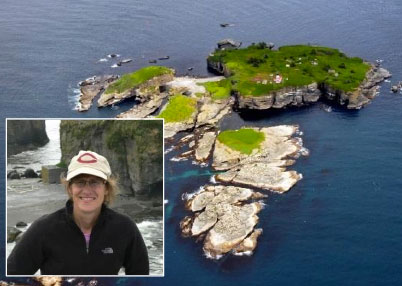Ecologist Cathy Pfister Kicks Off MBL Fall Seminar Series, September 12

WOODS HOLE, MA—The 2014 MBL (Marine Biological Laboratory) Distinguished Scientist Seminar Series will kick off on Friday, September 12 with a talk by University of Chicago professor Cathy Pfister. Pfister will discuss the ecology of rocky shores, in particular her work on the remote Tatoosh Island, off the west coast of Washington State. The lecture, titled “Productivity on Rocky Shores: From Microbes to Animals” will begin at 3:00 PM in the Speck Auditorium, Rowe Building, 10 MBL St., Woods Hole. The public is invited to attend. The talk is sponsored by the MBL’s Ecosystems Center.

The Distinguished Scientist Seminar Series is part of the Ecosystem Center’s Semester in Environmental Science (SES), a 15-week program that immerses undergraduate science students in an intensive semester of hands-on ecological science using a curriculum that approaches environmental science from an ecosystems perspective. The Distinguished Scientists Seminar Series gives SES students and the public an opportunity to meet and interact with some of the best practitioners of environmental science in the world.
Pfister received her doctorate at the University of Washington. In 1995 she joined the faculty of the University of Chicago, rising to full professor in 2013. Pfister has published more than 50 papers on a broad spectrum of topics ranging from studies of fish diversity in tide pools, to population modeling, to studies of the of microbial assemblages associated with California mussels. She has studied how nutrients affect kelp productivity, evaluated the relative importance of oceanic and coastal currents and upwelling on intertidal ecosystems, and, most recently, begun to explore how climate change and ocean acidification might alter rocky shore communities.
The Distinguished Scientist Lecture Series will continue throughout the fall at the MBL. The remaining lectures in the series are:
September 19—3:00 PM, Speck Auditorium, Rowe Building, 10 MBL St., Woods Hole
John Blair, Kansas State University
“Assessing Multiple Controls of Primary Productivity in Tallgrass Prairie: The Konza Prairie LTER Program”
October 10—3:00 PM, Speck Auditorium, Rowe Building, 10 MBL St., Woods Hole
Jill S. Baron, U.S. Geological Survey and Colorado State University
“Double Whammy: Both Reactive Nitrogen in Deposition and Climate Change Influence High Elevation Rocky Mountain Ecosystems”
October 24—3:00 PM, Lillie Auditorium, 7 MBL St., Woods Hole
Daniel Conley, Lund University, Sweden
“Is “Geo-Engineering” an Acceptable Solution for Baltic Sea Eutrophication?”
—###—
The Marine Biological Laboratory (MBL) is dedicated to scientific discovery and improving the human condition through research and education in biology, biomedicine, and environmental science. Founded in Woods Hole, Massachusetts, in 1888, the MBL is a private, nonprofit institution and an affiliate of the University of Chicago.